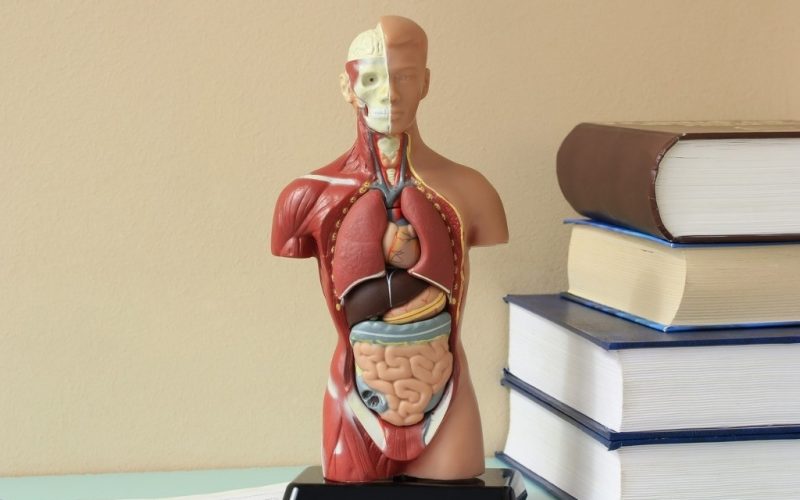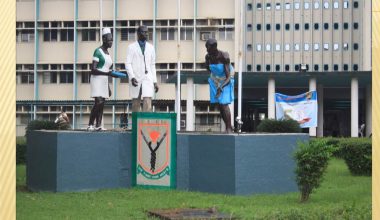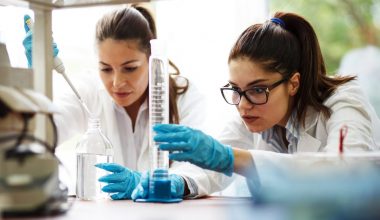You know , it’s really unfortunate that so many people in Nigeria don’t see the value in studying physiology. I mean, just think about it – physiology is like the secret sauce of human life!
It’s the key to understanding how our bodies function and how diseases develop. But for some reason, it just doesn’t get the respect it deserves.
This is likely due to several factors, such as misconceptions about the job market for physiology graduates, or the belief that the course is not as prestigious as other courses.
Well, you know that there’s so much potential in this field, and that’s what counts. So don’t let anyone tell you otherwise! If you’re not very convinced, this article will talk about all you need to know about this field. From the best physiology courses in Nigeria to the universities offering the courses, the fees, and every other question you may have.
Table of contents
- Physiology
- Is physiology a medical course?
- Is physiology a health course?
- What is the main work of a physiologist?
- Can a physiologist become a pharmacist?
- Is physiology a good course in Nigeria?
- Is physiology a lucrative course in Nigeria?
- What do you learn in physiology?
- Physiology courses in Nigeria
- 1. B.Sc. Human Physiology
- 2. B.Sc. Animal Physiology
- 3. B.Sc. Plant Physiology
- 4. B.Sc. Exercise Physiology
- 5. B.Sc. Physiotherapy
- 6. B.Sc. Nutrition and Physiology
- 7. B.Sc. Anatomy and Physiology
- 8. Diploma in Physiology
- 9. B.Sc. Clinical Physiology
- 10. B.Sc. Sports Physiology
- 11. M.Sc. Physiological Sciences
- Is physiology hard or easy?
- How long does it take to study Physiology in Nigeria?
- What qualifications do you need to study physiology?
- Where can I work if I study physiology in Nigeria?
- Can a physiologist become a pharmacist?
- Can I switch from physiology to nursing?
- Can a physiologist become a physician assistant?
- Which is better between physiology and physiotherapy?
- Which is better, biochemistry or physiology?
- Which is better between anatomy and physiology?
- Can I do masters in nursing with a BSc in physiology?
- Which University offers physiology in Nigeria?
- How much does it cost to study physiology in Nigeria?
- Is it advisable to study Physiology in Nigeria?
- FAQs
- Conclusion
- References
- Recommendations
Physiology
So, what is physiology all about as a course?
Physiology is all about how our bodies work. It’s like peeling back the layers of a really complex onion. You get to study the function of the organs, the different systems in the body, and how they interact.
Plus, you learn about things like homeostasis (that’s fancy talk for how your body keeps itself balanced) and how your body responds to changes. It’s basically like unlocking all the secrets of the human body, and it’s pretty fascinating stuff.
When you study physiology, you don’t just learn about how the body works in healthy people. You also learn about what happens when things go wrong. For example, you might learn about diseases like diabetes or cancer and how they affect the body.
Read: 20+ Best Science Courses for Female | 2024
Is physiology a medical course?
Physiology is like the study of how the body works, right? And medical courses are all about understanding diseases and treating people.
So, you might be thinking, “Isn’t physiology kinda medical-ish?” Well, here’s the thing: Physiology is definitely related to medicine, but it’s not quite the same thing.
It’s more like the foundation that medical courses are built on. In a way, you could say that physiology is the base layer of the medical cake, and medical courses are the icing on top.
Is a physiologist a doctor?
Well, not exactly. You see, doctors (or physicians) are trained to diagnose and treat diseases in people. They go through medical school, residency, and all that.
Physiologists, on the other hand, are scientists who study the way the body functions. They don’t treat patients, but they do help doctors understand diseases better. So, while physiologists and doctors are both in the medical field, they have different roles.
Can I become a doctor after studying physiology?
Studying physiology can be a great stepping stone if you’re interested in becoming a doctor. It gives you a solid understanding of how the body works, which can be a huge help when you’re studying to become a doctor.
Of course, you’ll still need to go to medical school and all that jazz, but having a background in physiology can make the process a bit smoother.
Plus, if you decide that being a doctor isn’t quite your thing, you can still have a career in physiology or related fields.
Is physiology a health course?
Yes!
It’s all about understanding how the body functions, which is pretty important stuff when it comes to health. After all, if you know how the body works, you can better understand diseases, how to prevent them, and how to treat them.
So, even though physiology isn’t a health course per se, it’s still super relevant to health and medicine.
Read: 25+ Best Courses to Study In Nigeria | 2024
What is the main work of a physiologist?
The main work of a physiologist is varied, but here are a few of their main gigs:
- Researching diseases: Physiologists might study how diseases affect the body and how they develop. This helps doctors better understand and treat these diseases.
- Improving health: Physiologists might also work on developing new ways to promote health and prevent diseases.
- Teaching: Some physiologists become professors and teach future doctors, nurses, and other health professionals about the body.
- Consultation: Physiologists might be called upon to consult with doctors or healthcare organizations on specific cases or research projects.
- Business: Some physiologists might even venture into business, working on developing new drugs, medical devices, or health technology.
Can a physiologist become a pharmacist?
A physiologist and a pharmacist are definitely different careers, but they both involve an understanding of how the body works. So, could a physiologist become a pharmacist?
Well, it’s technically possible, but it would take a lot of extra education. Pharmacists have to go through a specific type of training called a Pharm.D. program, which teaches them about medicines and how to prescribe them.
Physiologists typically don’t have this training, so they’d have to go back to school to become a pharmacists.
Is physiology a good course in Nigeria?
The short answer is: YES, physiology is a great course! It can open up all kinds of doors for you in the health and science fields.
For one thing, it gives you a super solid understanding of how the body works, which is pretty darn useful no matter what career you end up in. Plus, it opens up a bunch of opportunities in research, medicine, education, and more.
So, if you’re interested in health and science, physiology is definitely a course worth considering.
Is physiology a lucrative course in Nigeria?
The answer is a little complicated, but here’s the thing:
On one hand, Nigeria has a growing demand for healthcare professionals, so if you’re a physiologist, you could definitely find work in the healthcare sector. However, salaries for physiologists in Nigeria can vary a lot depending on factors like experience, location, and type of employer.
On the other hand, some physiologists choose to pursue further education or training in fields like medicine or research, which can lead to higher-paying positions.
One other thing to consider is that the job market for physiologists in Nigeria is fairly competitive. So, even though the demand is growing, you might have to work a little harder to land a job or to advance your career.
What do you learn in physiology?
Let’s find a better way to explain it so you will understand how beautiful this course is, especially for Nigerians who underrate this course.
So, imagine you’re peering into the body, getting an inside look at all the amazing stuff that keeps us alive and kicking. You start with the smallest building blocks, the cells, and then you move on to the organs, like the heart and the lungs.
Then you go into the systems, from the respiratory system that helps you breathe to the nervous system that keeps your body functioning properly.
And that’s just the tip of the iceberg! As you keep exploring physiology, you start to see how everything in the body is connected. You learn about how different parts of the body interact, like how the nervous system tells your muscles to move and how the digestive system breaks down food to give you energy.
Plus, you start to understand how the body responds to changes in the environment, from extreme temperatures to high-stress situations.
The course is basically all about understanding the inner workings of the human body.
Physiology courses in Nigeria
See the best physiology courses in Nigeria:
1. B.Sc. Human Physiology
This human physiology course focuses on how the human body works, from the smallest cells to the most complex systems.
Think about it as taking a tour of the human body, inside and out. You’ll learn about how our cells function, how organs work, how diseases develop, and how the body responds to changes in the environment.
Plus, this course will help you learn how to conduct research, collect data, and analyze results. These skills will come in handy when you start looking for jobs after graduation.
2. B.Sc. Animal Physiology
This course is similar to Human Physiology, but instead of focusing on humans, it goes into the inner workings of animals.
You’ll learn about how animals function, from the cellular level to the whole animal. During the course, you’ll study topics like animal anatomy, animal behavior, and animal ecology. You might even get to do some hands-on work, like dissecting animals or studying animal behavior in the field.
3. B.Sc. Plant Physiology
This one is all about understanding how plants work, from the tiniest chloroplasts to the tallest trees. You’ll learn about how plants grow, develop, and respond to their environment, as well as how plants interact with other organisms.
In Nigeria, you can pursue this course as a bachelor’s degree program, where you’ll study topics like plant anatomy, plant biochemistry, and plant genetics.
You might even get to do some hands-on work in a greenhouse or a laboratory, studying the physiology of different plants.
Also, read: Wigwe University Courses and Fees | All You Need to Know About the School
4. B.Sc. Exercise Physiology
This one focuses on the interaction between physical activity and the human body. It’s all about how the body responds to exercise, from changes in muscle and bone structure to adjustments in the cardiovascular system.
In this course, you’ll study topics like biomechanics, exercise biochemistry, and sports nutrition. Also, you might get to work with athletes, studying how their bodies respond to different types of training and diet. It’s a cool mix of science and sports!
5. B.Sc. Physiotherapy
This course is all about understanding how the human body moves and functions, and how to use physical therapy techniques to improve movement and reduce pain. It’s like being a body mechanic!
In school, you’ll learn about human anatomy, human physiology, and how the nervous system affects movement. You’ll also study different types of therapy, from massage to exercise, and how to use them to help people with injuries, disabilities, or chronic pain.
6. B.Sc. Nutrition and Physiology
This one goes really deep into how the body processes food and how nutrition affects human health. If there’s ever been a thing as being a food detective, then that is what this course is about.
Here, you’ll learn about the science of nutrition and how nutrients like proteins, fats, and carbohydrates are digested and used by the body. You’ll also study how nutrition affects different body systems, like the cardiovascular system and the immune system.
Plus, you’ll get to learn about how nutrition affects health and disease, and how you can use nutrition to improve overall health and wellness.
7. B.Sc. Anatomy and Physiology
This course combines two fields: anatomy, which is the study of the structure of the body, and physiology, which is the study of how the body functions.
During the course, you’ll learn about the structure of the human body, from bones and muscles to organs and systems. Also, you’ll study how these structures function and interact with each other.
And you’ll learn about how diseases and injuries affect the body, and how they can be treated.
8. Diploma in Physiology
Unlike a bachelor’s degree, a diploma is a shorter course that gives you a foundational understanding of physiology. It’s like taking a crash course in how the body works!
During the diploma program, you’ll study the basics of human physiology, like how cells and organs function, and how the body responds to changes in the environment. It’s a good starting point if you’re interested in a career in health or medicine.
You’ll also learn about how diseases affect the body, and how they can be treated.
9. B.Sc. Clinical Physiology
This is a course that’s all about using medical tests and procedures to diagnose and treat diseases.
In this one, you’ll learn about different types of diagnostic tests and procedures, like blood tests, imaging tests, and physical exams. You will also study how these tests can be used to diagnose and monitor different diseases and conditions.
And then you’ll learn about how to interpret test results and use them to make treatment recommendations.
10. B.Sc. Sports Physiology
This course focuses on how the body responds to physical activity and how you can optimize performance in sports.
It just goes into how different types of exercise affect the body, like how strength training builds muscle and how endurance training improves cardiovascular fitness.
You will get to learn how nutrition, hydration, and sleep affect performance, and how to use these factors to optimize athletic performance. Plus, you’ll learn about how to design and implement training programs for different athletes and sports.
11. M.Sc. Physiological Sciences
This course goes deeper into physiology than a bachelor’s degree and can lead to a range of careers in healthcare and research.
During the course, you’ll learn about advanced topics in physiology, like neurophysiology and endocrinology. You’ll also get to study how different diseases affect the body, and how to use this knowledge to develop new treatments.
Is physiology hard or easy?
Physiology is definitely not a walk in the park! But it’s also not impossible to learn if you’re willing to put in the work.
Here’s the thing: physiology involves a lot of complex concepts, like how the body responds to different stimuli and how diseases develop.
So, it requires a good understanding of biology, chemistry, and physics. And it involves a lot of studying, memorization, and critical thinking.
How long does it take to study Physiology in Nigeria?
In Nigeria, it usually takes about four to five years to complete a Bachelor’s degree in Physiology. That’s the standard length of time for most undergraduate degree programs in Nigeria.
During those four to five years, you’ll have to complete coursework, exams, and sometimes a research project or thesis. Depending on the university you choose, you might also have to do a compulsory internship or practical training as part of your degree program.
What qualifications do you need to study physiology?
So, to study Physiology in Nigeria, you’ll need some key qualifications. First, you’ll need to have passed your O’level (WAEC or NECO) exams with at least five credits, including English, Math, Chemistry, Biology, and Physics. These are the basic subjects you’ll need to study Physiology.
Then you’ll need to do well in the UTME exam. Sometimes, universities in Nigeria will also ask you to write a post-UTME exam. This is an extra exam that the university sets to assess your suitability for the program.
So, if you’re planning to study Physiology, it’s important to keep an eye out for post-UTME requirements.
See Also: UNICAL Cut Off Mark For All Courses | 2024/2025 Admission Requirements and Fees
Where can I work if I study physiology in Nigeria?
If you study Physiology in Nigeria, you’ll have lots of career opportunities to explore. For starters, you could work in healthcare, helping patients recover from injuries or illnesses. Physiotherapists, for example, use physical methods like massage and exercise to help patients get better.
You could also work in research, studying how diseases affect the body and developing new treatments. You could work in a lab, or even do fieldwork, collecting data and testing new treatments.
And if you’re interested in teaching, you could become a physiology lecturer at a university or college.
Can a physiologist become a pharmacist?
Yes, you can. It’s technically possible for a physiologist to become a pharmacist, but it’s not a common career path. Both fields involve studying how the body works and how it responds to different treatments, but they focus on different aspects of healthcare.
Pharmacists study drugs and how they interact with the body. They work in pharmacies, hospitals, and research labs, providing expert advice on medications and working to develop new drugs.
Physiologists study the body’s systems and how they work. They often focus on a specific area, like exercise physiology or neurophysiology.
Can I switch from physiology to nursing?
If you’re interested in switching from Physiology to Nursing, it’s definitely possible. The two fields have a lot of overlap, so your background in Physiology will give you a solid foundation in healthcare.
To become a nurse in Nigeria, you’ll need to enroll in a nursing program and complete the required training and education.
Depending on your current qualifications and the nursing program you choose, you might have to start at the beginning, or you might be able to enter the program at an advanced level.
Also see: Is a Nursing Degree Hard? | 2024 Expert Tips
Can a physiologist become a physician assistant?
Yes, a physiologist can become a physician assistant (PA) in Nigeria, but there might be some extra steps involved. Physiology and physician assistant studies have some overlap, but they’re not exactly the same.
To become a PA in Nigeria, you’ll need to enroll in a physician assistant program and complete the required education and training.
Which is better between physiology and physiotherapy?
Deciding which is better between Physiology and Physiotherapy really depends on what you’re interested in and what kind of career you want.
Physiology is more focused on the scientific study of the body, while Physiotherapy is more hands-on, using physical methods to treat patients.
If you’re interested in research and understanding how the body works, Physiology might be a better fit. But if you’re interested in working directly with patients and helping them recover from injuries and illnesses, Physiotherapy could be the way to go.
Can I become a physiotherapist with a physiology degree?
It’s possible to become a physiotherapist with a physiology degree, but it might be a bit of a winding road. You see, Physiotherapy programs usually require specific prerequisites, like courses in anatomy and kinesiology, that might not be covered in a physiology degree.
If you’re serious about becoming a physiotherapist, you might have to take some additional courses to meet the prerequisites for a Physiotherapy program.
Alternatively, you could look into Physiotherapy programs that accept students with a bachelor’s degree in a related field, like physiology.
Which is better, biochemistry or physiology?
Choosing between biochemistry and physiology really depends on your interests and career goals. Both fields have their merits, and both can lead to exciting and fulfilling careers.
Biochemistry focuses on the chemical processes that occur in living organisms, like how cells break down food to produce energy or how DNA is copied and translated into proteins.
Physiology focuses on how the body’s systems work and interact, like how the nervous system controls movement or how the immune system fights off infections.
So, if you’re interested in understanding the chemical reactions that keep us alive and healthy, biochemistry might be the way to go.
Which is better between anatomy and physiology?
Anatomy or physiology? It’s like asking if a car is more important for its engine or its wheels.
Anatomy is the study of the body’s structure, like the bones, muscles, and organs. Physiology is the study of how the body’s systems work, like how the nervous system sends signals or how the digestive system breaks down food.
So, both are important for understanding the human body.
Which is more difficult anatomy or physiology?
Well, it really depends on the person. Some people might find anatomy easier because it’s more visual, while others might prefer physiology because it’s more focused on concepts and systems.
That being said, many people find physiology a bit more difficult because it involves a lot of memorization and understanding of complex systems.
Can I do masters in nursing with a BSc in physiology?
The short answer is maybe. Some nursing programs might accept applicants with a BSc in physiology, but it really depends on the specific program and the requirements.
Nursing programs usually require applicants to have a background in biology, chemistry, anatomy, and physiology. Since you have the physiology part covered, you might be able to meet some of those requirements.
But you might need to take some extra courses or get some clinical experience to meet all the requirements.
Which University offers physiology in Nigeria?
Here are the best universities that offer physiology in Nigeria:
1. University of Lagos (UNILAG
This university is one of the top universities in Nigeria, and its physiology department is known for its strong research programs and excellent teaching.
The physiology department at UNILAG offers undergraduate and graduate programs, and they focus on topics like human and animal physiology, exercise physiology, and neurophysiology. They also offer internships and research opportunities for students.
Read: UNILAG Cut Off Mark for All Courses | JAMB and Post UTME
2. University of Ibadan (UI)
This university is the oldest in Nigeria, and its physiology department is one of the best in the country.
The faculty at UI are all experts in their fields, and they’re actively involved in research in areas like cardiovascular physiology, neurophysiology, and immunophysiology.
The physiology department at UI offers a bachelor’s degree program and a master’s degree program. Students in the program get to work in the university’s state-of-the-art labs and get hands-on experience with advanced research techniques.
Also, read: University Of Ibadan (UI) JAMB cut-off mark for all courses | 2024
3. Ahmadu Bello University (ABU)
ABU’s physiology department offers undergraduate and graduate programs, and they cover everything from human physiology and exercise physiology to neurophysiology and molecular physiology.
One cool thing about ABU is that they have a strong emphasis on hands-on learning. Students get to work in labs and clinics, and they even get to participate in fieldwork and community health projects.
4. University of Port Harcourt (UNIPORT)
The physiology department at UNIPORT offers undergraduate and graduate programs in areas like human physiology, animal physiology, and exercise physiology.
They also have a strong focus on tropical physiology, which looks at how the body responds to the unique environmental conditions of tropical regions.
5. Obafemi Awolowo University (OAU)
This university is known for its strong academic programs and research, and its physiology department is no exception.
The physiology department at OAU offers undergraduate and graduate programs, with courses in areas like human physiology, exercise physiology, and environmental physiology.
Also, they have a strong focus on medical physiology, which looks at how the body responds to different diseases and treatments.
See Also: OAU Aggregate Cut-Off Mark For All Courses | 2024 Fees And Admission Requirements
How much does it cost to study physiology in Nigeria?
When it comes to studying Physiology in Nigeria, the cost can vary depending on the university you choose. But let’s use UNILAG as an example to give you a ballpark figure of what to expect.
For students in the Faculty of Social Sciences, the general fees for studying Physiology at UNILAG are NGN166,300 for courses with lab or studio, and NGN116,325 for courses without laboratory – according to Eduninfo.org.
So, there you have it!
Is it advisable to study Physiology in Nigeria?
If you’re passionate about the human body and how it works, studying Physiology in Nigeria can be a great option. It can give you a strong foundation in the sciences and open up a variety of career paths in healthcare, research, and education.
FAQs
Human physiology is the best physiology course.
Yes, physiology is typically a 4-year course in Nigeria.
Yes, physiologists can work in hospitals.
Conclusion
So, you see? Studying physiology in Nigeria can be a fantastic choice for anyone interested in understanding the inner workings of the human body.
Despite the many misconceptions surrounding the field, it comes with different career opportunities and can provide valuable insight into human health and wellness. If you’re passionate about physiology, don’t let anyone dissuade you from pursuing your dream.
References
- quora.com – Is physiology a good course in Nigeria and what are the career opportunities?
- nigerianscholar.com – Universities that Offer Physiology
- nairaland.com – Is It Wrong To Study Human Physiology?






